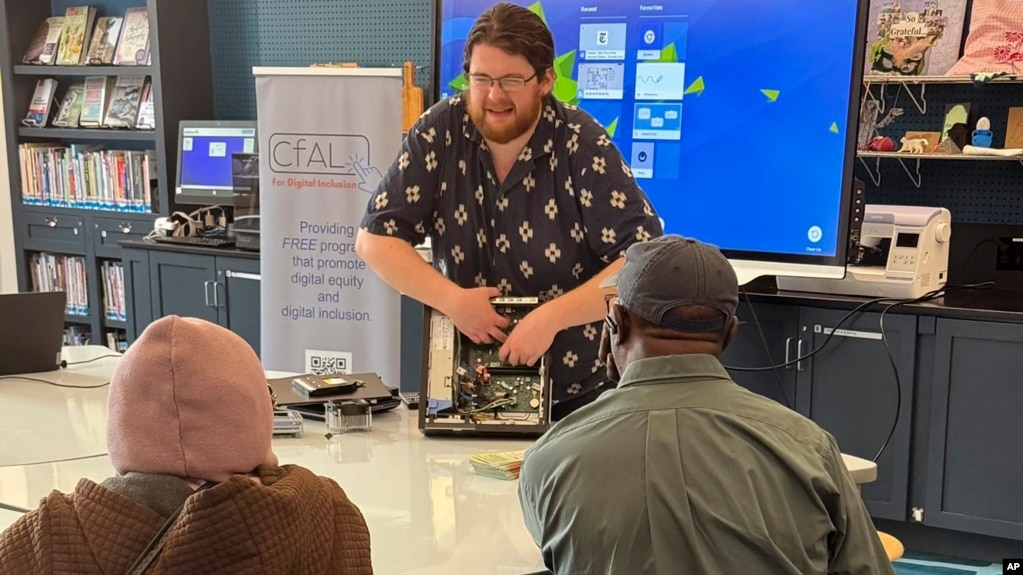企業や組織の生成AIの導入が進んでいます。これにより私たちを取り巻く生活環境、ビジネスが大きく変わろうとしています。
企業や組織には、生成AIが生み出す新たなコンテンツやアイデアにより、市場競争の中で顧客満足度を上げ、新たな顧客獲得し、業務の自動化の実現で時間やコスト削減が期待されています。
私たちも、専門知識なく簡単な指示のみで多様なコンテンツを作成が可能になります。教育からエンタメと多岐にわたる領域で活用されます。
しかしそこには様々なリスクが想起されます。ディープフェイクや誤情報生成、権利侵害、情報の漏洩などなど。
AIエンジニア教育はどうしたらいいのでしょうか?
※AIエンジニアになるには:
AIエンジニアになるには?|仕事内容や必要な資格|OCA大阪デザイン&IT専門学校
そこでAIエンジニアをどうやって育てるのか、このVOAニュースで認識を深めたいと思います。
US States to Train Workers on AI in Workplace
Artificial intelligence (AI) tools continue to expand in the workplace. And some U.S. states have launched specialized programs to train workers on how to deal with the new technologies.
Many industries are expected to heavily depend on a series of tools known as generative AI. This technology includes systems designed to perform many jobs currently done by humans. Such systems have become increasingly smarter in recent years.
In Connecticut, officials have been working to create what they hope will be the country’s first Citizens AI Academy. This will be a free, online collection of special classes designed to teach basic AI skills and provide certifications needed for employment.
Connecticut Democratic Senator James Maroney told the Associated Press that AI changes in the workplace are happening very quickly. "So we need to all learn what are the best sources for staying current,” he said. “How can we update our skills? Who can be trusted sources?”
Gregory LaBlanc is a professor of Finance, Strategy and Law at the Haas School of Business at Berkeley Law School in California. He says workers should be taught how to use and manage generative AI.
LaBlanc said he thinks it makes more sense to center on teaching ways to support AI “as opposed to learning to be really bad imitators of AI." He added that employees should be trained in areas where AI does not perform well so that workers can make up the difference.
This year, at least four states proposed legislation that sought ways to deal with AI in the classroom. Those states included Connecticut, California, Mississippi and Maryland.
One bill in California would require a state working group to consider including AI literacy skills in math, science, history and social science studies.
The writer of the bill is California Assemblyman Marc Berman. He said in a statement that AI offers the possibility to improve parts of our lives. “But only if we know how to use it, and use it responsibly,” he added.
Berman noted that all students should be taught about basic AI elements and systems. He said students should also learn “the skills to recognize when AI is employed…”
In Connecticut, Senator Maroney said his state’s planned AI Academy will also aim to provide studies on AI basics. He noted the importance for people to have the skills to understand, examine and effectively interact with a range of AI technologies.
A study released by the job-search company Indeed found that all U.S. jobs listed on the service had skills that could be performed or improved by generative AI tools.
Nearly 20 percent of the Indeed job listings were considered “highly exposed.” This means the technology is considered good or excellent at 80 percent of the skills the jobs require. Nearly 46 percent of jobs on the service were “moderately exposed.” This means that AI tools can perform 50 to 80 percent of the skills.
Maroney said he is concerned that AI will worsen existing equity problems related to a lack of high-speed internet, computers and smart phones in some underserved communities. Inequities have been identified between more digitally literate people, often living in cities, and those living in more rural areas without dependable internet and modern devices.
Marvin Venay shares that concern. He is with the Massachusetts-based group Bring Tech Home Advocates. The group has been working for years to narrow differences in computer literacy and high-speed internet availability.
Venay said, “Education must be included in order for this to really take off publicly...in a manner which is going to give people the ability to eliminate their barriers.”
Venay added, “And it has to be able to explain to the most common individual why it is not only a useful tool, but why this tool will be something that can be trusted.”
Words in This Story
certification – n. the process of earning an official document that serves as proof of certain skills
update – v. to add new information to something
imitate – v. to behave in a similar way to someone or something else
literacy – n. knowledge of a particular subject
expose – v. to put someone at risk from something harmful or unpleasant
eliminate – v. to remove or take something away
米国各州、職場におけるAIについて労働者を訓練へ(和訳)
人工知能(AI)ツールは職場で拡大を続けています。そして米国のいくつかの州は、新しいテクノロジーに対処する方法を労働者に教育する専門プログラムを立ち上げています。
多くの産業が、生成AIと呼ばれる一連のツールに大きく依存すると予想されています。この技術は、現在人間が行っている多くの仕事を行うように設計されたシステムを含んでいます。このようなシステムは近年ますます賢くなっています。
コネティカット州では、政府関係者は国内初の市民AIアカデミーになることを望んでいる設立に取り組んでいます。これは、基本的なAIスキルを教え、雇用に必要な資格を提供することを目的とした、無料のオンライン特別授業となります。
コネチカット州選出の民主党上院議員、ジェームズ・マロニー氏はAP通信の取材に対し、職場におけるAIの変化は非常に急速に起こっていると語っています。「そのため、私たちは最新の情報を得るための最良の情報源は何かを学ぶ必要があります。どうすればスキルを更新できるのか?信頼できる情報源は誰なのか?」と彼は言います。
グレゴリー・ラブラン氏は、カリフォルニア州バークレー・ロースクールのハース・スクール・オブ・ビジネスで金融・戦略・法律を教えています。彼は、労働者は生成AIの使い方と管理方法を教わるべきだと言います。
ラブラン氏は、「AIの本当に悪い模倣者になることを学ぶのとは対照的に、AIをサポートする方法を教えることを中心に据える方が理にかなっていると思います」と述べました。さらに、AIがうまく機能しない分野については、従業員がその差を埋められるように訓練を受けるべきだと付け加えています。
今年、少なくとも4つの州が、授業でAIを扱う方法を模索する法案を提出しました。これらの州には、コネチカット州、カリフォルニア州、ミシシッピ州、メリーランド州が含まれます。
カリフォルニア州のある法案は、州の作業部会に対し、数学、科学、歴史、社会科学の学習にAIリテラシー・スキルを含めることを検討するよう求めています。
この法案を提出したのは、カリフォルニア州議会議員のマーク・バーマン氏です。彼は声明の中で、AIは私たちの生活の一部を改善する可能性があると述べています。「しかし、我々がその使い方を知り、責任を持って使用する場合に限ります」と付け加えています。
バーマン氏は、すべての学生が基本的なAIの要素とシステムについて学ぶべきだと指摘しています。また、学生は ”AIが使用されたときに…それを認識するスキル” も学ぶべきだと述べます。
コネティカット州では、マロニー上院議員が、同州で計画されているAIアカデミーもAIの基礎について学ぶことを目的としていると述べています。マロニー議員は、さまざまなAI技術を理解し、検討し、効果的にやりとりするスキルを身につけることの重要性を指摘します。
求人検索会社Indeedが発表した調査によると、同サービスに掲載されている米国の求人にはすべて、生成AIツールによって実行または改善できるスキルがあることがわかりました。
Indeedの求人情報の20%近くが、“highly exposed” と判断されました。これは、求人が必要とするスキルの80パーセントにおいて、その技術が優れているか、優れていると考えられることを意味します。同サービスに掲載された求人の46%近くは、“moderately exposed” でした。これは、AIツールがスキルの50~80%をこなせることを意味します。
マロニー氏は、AIが、一部の十分なサービスを受けていないコミュニティにおける高速インターネット、コンピューター、スマートフォンの不足に関連する既存の公平性の問題を悪化させることを懸念しています。多くの場合、都市部に住むデジタルリテラシーの高い人々と、信頼できるインターネットや最新機器のない農村部に住む人々の間に不公平があることが指摘されています。
マービン・ヴェネイ氏はこの懸念を共有しています。彼はマサチューセッツ州を拠点とするBring Tech Home Advocatesというグループに所属しています。このグループは、コンピューター・リテラシーと高速インターネットの利用可能性の差を縮めるために何年も活動してきました。
ヴェネイ氏は言っています 「これが本当に一般に普及するためには、教育が含まれなければなりません.....人々に障害を取り除く能力を与えるような形で 」と。
「そして、なぜこのツールが便利なツールであるだけでなく、なぜこのツールが信頼できるものになるのかを、最も一般的な個人に説明できなければなりません」とヴェネイ氏は付け加えます。
